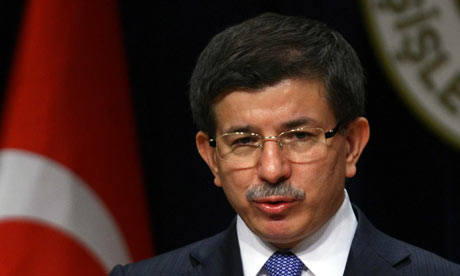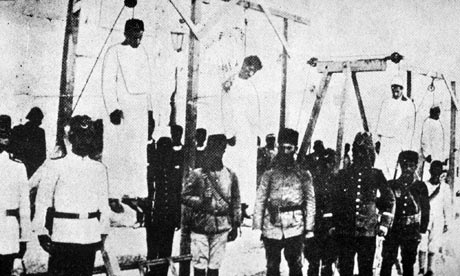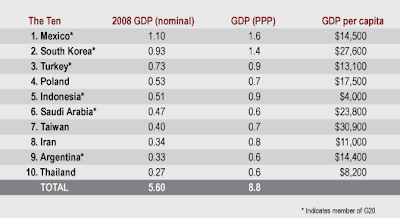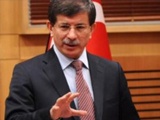The Israelis are trying to teach the Turks a lesson…….This was simply an act of punishment for Turkey for not being nice to Israel and for courting Iran.
MJ Rosenberg
Senior Fellow Media Matters Action Network
Posted: March 5, 2010 11:42 AM
That battle is now being carried to Washington. The Israelis are trying to teach the Turks a lesson. If the Armenian resolution passes both houses and goes into effect, it will not be out of some newfound compassion for the victims of the Armenian genocide and their descendants, but to send a message to Turkey: if you mess with Israel, its lobby will make Turkey pay a price in Washington.
==========================================================
MJ Rosenberg
M.J. Rosenberg is the former Director of Policy Analysis for Israel Policy Forum (IPF).
In this position, MJ heads IPF’s Washington, D.C. office and writes IPF Friday, a weekly opinion column on the Arab-Israeli conflict which is widely circulated throughout the United States and the Middle East. In addition, MJ has published numerous op-eds, in the national and Jewish press.
MJ spent eighteen years within the United States government, fourteen on Capitol Hill as an aide to Representatives Jonathan Bingham (D-New York), Edward Feighan (D-Ohio) and Nita Lowey (D-New York) and Senator Carl Levin (D-Michigan). Immediately prior to coming to IPF, he was a political appointee to USAID, where he served as Chief of Staff for Thomas Dine, the head of the Eastern Europe/NIS Bureau of USAID.
From 1982 to 1986, MJ was editor of Near East Report, the American Israel Public Affair Committee’s (AIPAC’s) biweekly publication on Middle East Policy.
=================================================================
Israel Lobby Gets Congress to Stick It to Turkey
Yesterday the House Foreign Affairs Committee passed the Armenian genocide resolution. That is the bill, kicking around for years, that recognizes the Armenian genocide as precisely that – genocide. The Turkish government has always strongly opposed the resolution, arguing – unconvincingly, in my opinion – that the slaughter of the Armenians occurred in the context of war and was not an attempt at their intentional eradication.
I never understood why the Turks care so much. The current democratic Turkish Republic was not even in existence during the Armenian slaughter. It is the successor state to the Ottoman Empire under which the killing took place. The current Turkish government is no more responsible for the Armenian genocide than the current German government is responsible for the Holocaust.
Nonetheless, the Turks vehemently oppose using the term “genocide” to describe the events of 1915.
And successive American administrations have deferred to the Turks by opposing Congressional bills “commemorating” the “Armenian genocide.”
It is no different this year. The Obama administration lobbied against the resolution because it believed that enacting it would disrupt our relations with Turkey, a fellow NATO member and our largest ally in the Middle East. It also argued that passing the bill now would disrupt negotiations now underway between Turkey and Armenia.
It passed anyway and the Turks immediately called its ambassador home.
But here is where it gets really interesting. The following comes from the Jewish Telegraphic Agency, the Associated Press of the Jewish world. JTA writes:
In the past, the pro-Israel community [i.e. the Israel lobby] , has lobbied hard against previous attempts to pass similar resolutions, citing warnings from Turkish officials that it could harm the
alliance not only with the United States but with Israel — although Israel has always tried to avoid mentioning the World War I-era genocide.
In the last year or so, however, officials of American pro-Israel groups have said that while they will not support new resolutions, they will no longer oppose them, citing Turkey’s heightened rhetorical attacks on Israel and a flourishing of outright anti-Semitism the government has done little to stem.
That has lifted the fetters for lawmakers like Berman (Chairman Howard Berman of the House Foreign Affairs Committee) , who had been loath to abet in the denial of a genocide; Berman and a host of other members of the House’s unofficial Jewish caucus have signed on as co-sponsors.
Get that. The lobby has always opposed deeming the Armenian slaughter a genocide largely because Turkey has (or had) good relations with Israel. And the lobby, and its Congressional acolytes, did not want to harm those relations.
But, since the Gaza war, Turkish-Israeli relations have deteriorated. The Turks, like pretty much every other nation on the planet, were appalled by the Israeli onslaught against the Gazans. And said so.
Ever since, the Netanyahu government has made a point to stick it to the Turks. Most famously, Deputy Foreign Minister Danny Ayalon seated the Turkish ambassador in a kindergarten chair during a meeting, and “forgot” to put a Turkish flag on the table alongside the Israeli flag. He then called the Israeli photographers in and said to them in Hebrew – so the Turkish ambassador wouldn’t understand, “The important thing is that they see he’s sitting lower and we’re up high and that there’s only one flag, and you see we’re not smiling.”
News of that episode so enraged the Turks and humiliated the Israelis that Ayalon had to apologize three times, in progressively more abject terms, or face a rupture in Israeli-Turkish relations.
That battle is now being carried to Washington. The Israelis are trying to teach the Turks a lesson. If the Armenian resolution passes both houses and goes into effect, it will not be out of some newfound compassion for the victims of the Armenian genocide and their descendants, but to send a message to Turkey: if you mess with Israel, its lobby will make Turkey pay a price in Washington.
And, just maybe, the United States will pay it too.
Follow MJ Rosenberg on Twitter: www.twitter.com/mjmediamatters
Huffington Post
686 words posted in Zionist provocation, Af-Pak war, , Israel • Leave a comment
COMMENTS
Dnlmsstch I’m a Fan of Dnlmsstch 17 fans permalink
The reason that the Turks have a problem admiting the genocide is becasue Mustafa Kamal and other founders of the Modern Secular Turkish Republic were involved – if not directly at least peripheraly – to admit that is like admiting that George Washington and other founder were complicit with the genocide of Native Americans.
Reply Favorite Flag as abusive Posted 04:46 PM on 3/05/2010
– lightningbolt I’m a Fan of lightningbolt 142 fans permalink
As usual, everything will be blamed on Israel. The Jewish people are the eternal scapegoat.
Reply Favorite Flag as abusive Posted 04:36 PM on 3/05/2010
– joeinvt I’m a Fan of joeinvt 13 fans permalink
Are you denying or defending the Armenian genocide? And are you opposed to lobbying generally or simply effective lobbying done by Jews?
Reply Favorite Flag as abusive Posted 03:48 PM on 3/05/2010
– mok10501 permalink
This comment is pending approval and won’t be displayed until it is approved.
Henry Kissinger was lobbying for the Turks, isn’t he the biggest Jew in the nation? What happened, didn’t the Turks paid enough? Oo, I see, that penny pincher doesn’t count ha?.
Favorite Flag as abusive Posted 05:10 PM on 3/05/2010
– lbsaltzman I’m a Fan of lbsaltzman 92 fans permalink
Excellent post. I am reminded of the shifting alliances in the novel 1984. Ironically Israel had better be careful or one day it may be that Congress will no longer be afraid to discuss the truth about Israel.
Reply Favorite Flag as abusive Posted 03:31 PM on 3/05/2010
– Annoula I’m a Fan of Annoula 21 fans permalink “That battle is now being carried to Washington. The Israelis are trying to teach the Turks a lesson. If the Armenian resolution passes both houses and goes into effect, it will not be out of some newfound compassion for the victims of the Armenian genocide and their descendants, but to send a message to Turkey: if you mess with Israel, its lobby will make Turkey pay a price in Washington. And, just maybe, the United States will pay it too. ”
Precisely that’s the core of the issue right now. That the US reserves the right to label war atrocities and crimes against humanity depending on how it fits its agenda and/or Israel’s. For as long as the relations between Israel and Turkey continued to be good, that resolution would never had made it out of Comittee. This was simply an act of punishment for Turkey for not being nice to Israel and for courting Iran. In my book, that’s called HYPOCRISY. The sad truth is the US has become a tool of the Likud party. And the attacks on 9/11 were a response to that. How much more is the US willing to sacrifice for the sake of the Zionists zealots?
Reply Favorite Flag as abusive Posted 03:06 PM on 3/05/2010



 Foreign minister Ahmet Davutoglu says describing the 1915 Armenian killings as genocide is an insult to Turkey’s ‘honour’. Photograph: Adem Altan/AFP/Getty Images
Foreign minister Ahmet Davutoglu says describing the 1915 Armenian killings as genocide is an insult to Turkey’s ‘honour’. Photograph: Adem Altan/AFP/Getty Images




 Ten economies are becoming the new locomotive for the global economy By Martin Walker Senior Director of A.T. Kearney’s Global Business Policy Council.
Ten economies are becoming the new locomotive for the global economy By Martin Walker Senior Director of A.T. Kearney’s Global Business Policy Council.


 whether they really want Armenia-Azerbaijan reconciliation- UPDATE
whether they really want Armenia-Azerbaijan reconciliation- UPDATE